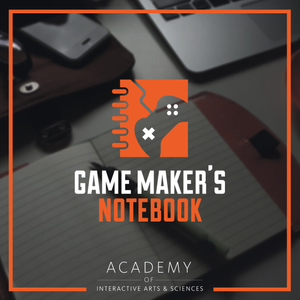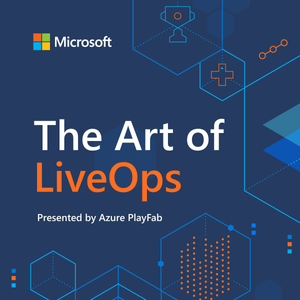
Game Theory 10: Hardware
Explicit content warning
11/08/12 • 63 min
Recorded on November 7th, 2012 with Brian Fife, James Fingal and Thomas Westberg.
Incremental improvements in game hardware (faster processing speed, more colors/pixels, etc.) are inevitable each generation, but generally don’t enable new game concepts. Tom covers a history of transformative hardware/platform features, including advanced sound, mass optical storage and network connectivity.
Jim reviews middleware platforms and the group discusses how third-party libraries and game platforms like Game Maker influence how games are built today.
Links to referenced items:
Pong,
Computer Space,
Gun Fight,
Atari 2600,
Fairchild Channel F,
Breakout,
Nintendo Entertainment System,
Chiptune,
Intellivison,
Super Mario Bros.,
Legend of Zelda,
Atari 7800,
Ballblazer,
Sierra,
Pro Audio Spectrum 16,
MIDI,
Pinball Construction Set,
Hard Drivin’,
Battlezone,
I, Robot,
Doom,
3dfx,
OpenGL,
Wolfenstein 3D,
Math co-processor,
Ultima Eight,
Goldeneye,
Halo,
Playstation One,
Texture Mapping,
Sega Genesis,
Final Fantasy Seven,
EEPROM,
SRAM,
Defender,
R3000,
Playstation Two,
Emotion Engine,
Middleware,
Unreal Engine,
id Tech,
XBox,
XBox Live,
XBox 360,
Playstation Three,
Killer App,
Jaguar,
ColecoVision,
Smurf: Rescue in Gargamel’s Castle,
Analog Stick,
Nintendo 64,
Haptic Feedback,
Audio Game,
Pinching the Harmonica - Hypercritical
Recorded on November 7th, 2012 with Brian Fife, James Fingal and Thomas Westberg.
Incremental improvements in game hardware (faster processing speed, more colors/pixels, etc.) are inevitable each generation, but generally don’t enable new game concepts. Tom covers a history of transformative hardware/platform features, including advanced sound, mass optical storage and network connectivity.
Jim reviews middleware platforms and the group discusses how third-party libraries and game platforms like Game Maker influence how games are built today.
Links to referenced items:
Pong,
Computer Space,
Gun Fight,
Atari 2600,
Fairchild Channel F,
Breakout,
Nintendo Entertainment System,
Chiptune,
Intellivison,
Super Mario Bros.,
Legend of Zelda,
Atari 7800,
Ballblazer,
Sierra,
Pro Audio Spectrum 16,
MIDI,
Pinball Construction Set,
Hard Drivin’,
Battlezone,
I, Robot,
Doom,
3dfx,
OpenGL,
Wolfenstein 3D,
Math co-processor,
Ultima Eight,
Goldeneye,
Halo,
Playstation One,
Texture Mapping,
Sega Genesis,
Final Fantasy Seven,
EEPROM,
SRAM,
Defender,
R3000,
Playstation Two,
Emotion Engine,
Middleware,
Unreal Engine,
id Tech,
XBox,
XBox Live,
XBox 360,
Playstation Three,
Killer App,
Jaguar,
ColecoVision,
Smurf: Rescue in Gargamel’s Castle,
Analog Stick,
Nintendo 64,
Haptic Feedback,
Audio Game,
Pinching the Harmonica - Hypercritical
Previous Episode

Game Theory 9: Loot
Recorded on October 11, 2012 with Brian Fife, James Fingal and Thomas Westberg.
Many games treat loot as another facet of levelling with different mechanics. Jim, Brian and Tom all have issues with the way that loot mechanics appear to be evolving in current games. Jim also has a principled objection to the way that loot reinforces materialism/consumerism. Many themes from Episode 5 - Grind are invoked.
Loot can be a great cause of stress. First, rapidly-levelling players often “grow out” of their loot and gear needs to be constantly refreshed for a player to remain competitive. Games like Torchlight or Borderlands also throw a great volume of loot drops at players, which requires effort to sort and sell.
Still, loot - particularly interesting and creative loot, has the ability to tug at our heartstrings. Brian, Jim and Tom discuss the Gameological Society’s ‘best treasure ever’ bracket and their own favorite in-game items.
Links to referenced items:
Starcraft,
Limbo,
Passage,
Domesticated Foxes,
Material World,
Dead Space,
God of War,
Legend of Zelda,
Dungeons and Dragons,
Elder Scrolls,
Borderlands,
Deus Ex: Human Revolution,
Torchlight Two,
Diablo,
Bastion,
Boxinalia,
Inner Wealth,
Dungeon Defenders,
World of Warcraft,
Wowhead,
Dragon Kill Points,
Best Treasure Ever,
Wabbajack,
Fallout 2,
Alien Blaster,
Steam Tonk,
Nethack,
Mjollnir.
Next Episode

Game Theory 11: Wikification
Recorded on November 21st, 2012 with Brian Fife, James Fingal and Thomas Westberg.
We’ve seen a dramatic shift in the way games are supported on the internet. Early on, gaming guides and magazines, as well as the occasional online FAQ or spoiler guide, were available, but now it’s almost a given that any game with a reasonable fan base has one or more dedicated websites around tricks, tips and strategies.
Two of the biggest changes are that site platforms like wikia make it very easy to create these player-supported websites, and it is now common, particularly for large MMOs, to have the data files for the game reverse engineered. So-called “database” websites can provide a comprehensive list of all the items that could appear in the game, before players have discovered them.
Jim, Brian and Tom talk about how these changes have impacted the way we play and interact with games. There’s certainly an opportunity for “help sites” to smooth over a rough patch in an otherwise well-designed game, but jumping directly to the loot tables has the ability to take a lot of the discovery and mystery out of a game... is it even possible to design a game with ‘secrets’ anymore?
Links to referenced items:
World of Warcraft,
Quest Tracker,
Nintendo Power Magazine,
Final Fantasy Three,
gameFAQs.com,
Monkey Island,
Nethack,
Dead Rising,
Dark Souls,
Fallout Two,
Skyrim,
X-Com: Enemy Unknown,
The Witcher,
King’s Quest Four,
Deus Ex: Human Revolution,
World of Tanks,
Starcraft,
Tetris,
EvE Online,
Grocery List Strategy - Tobolds
Half Life Two,
[Portal,](http://en.wikipedia.org/wiki/Portal_(video_game)
Fez,
Jonathan Blow,
Secret World - Tom Chick,
Star Wars: The Old Republic,
Mario Kart,
Letterpress,
Spell Tower,
Lose/Lose - Zach Gage,
Bit Pilot,
Eufloria,
On the Wind,
The Last Rocket,
Pulse,
Blind World,
Infinity Blade,
Eliss,
Guitar Hero,
Torchlight,
Dead Trigger,
Zombi U,
If you like this episode you’ll love
Episode Comments
Generate a badge
Get a badge for your website that links back to this episode
<a href="https://goodpods.com/podcasts/game-theory-podcast-27294/game-theory-10-hardware-951933"> <img src="https://storage.googleapis.com/goodpods-images-bucket/badges/generic-badge-1.svg" alt="listen to game theory 10: hardware on goodpods" style="width: 225px" /> </a>
Copy




